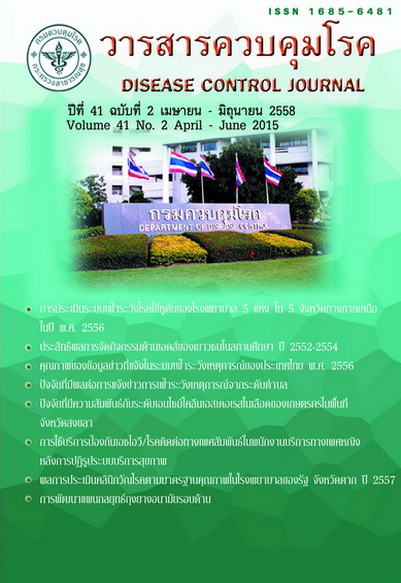The effectiveness of operating the AIDS activities for youths in education institutes, years 2009-2011
DOI:
https://doi.org/10.14456/dcj.2015.19Keywords:
AIDS activities, youthsAbstract
The objective of this research is to study the effectiveness of perception of AIDS activities for youth'ร education institute es, Chonburi Province and lesson distilled AIDS intervention activities and evalu¬ation youth's satisfaction towards participation. Including to area expansion in other education institutes. The study is the quasi-experiment research of One group Pretest-Postest design. The samples are 867 youth's education institutes. Data was analyzed by quantitative and qualitative methods. The results showed that the better knowledge and attitude towards AIDS. Also, they had right understanding more than the day before and had statistically significant of (p<0.001). And increase rate of using condoms in most recent times when they had sexual relation with the heterosexual couples of statistically significant of (p<0.05). Lesson distilled found that the conceptual of driving activities by network-teams can give out that youths in each education institutes and use kinds of activities. Therefore strategies of working as network-teams are important. There are not enough to change of their youth's behavior. In addition unreadiness and lack of potential sex-education of teachers. The activities was emphasized on the process more than the results themselves, lack of integra¬tion in each dimension, therefore youth-leaders and teachers would not continuously setting the activities if it was not agreed or contingent to the policy, budget and knowledge or network-teams. Analyzed these process found that some activities were lack of youth's participation, follow up then enabled to the quality and not strongly enough to achieve long term goal. Designed for the programs suitable for perception, the change responsibility of in-change during the process should be aware not to happen as that would cause learning not continually. The qualification of youth-leaders must be clear. Good relationship and support would make the projects to succeed. Result of project showed better health behavior and got to learn, be model as well, develop skills and knowledge sharing from other institutes. They had knowledge and high satisfaction to further developments. Therefore, organizing learning activities, teachers'potential and supportments will be effect on youths to change their health behavior.
Downloads
References
2. ศิริกุล อิศรานุรักษ์, บังอร เทพเทียน, สมศักดิ์ วงศาวาส, ปิยฉัตร ตระกูลวงษ์, ปรินดา ตาสี. การศึกษาแนวโน้มพฤติกรรมที่สัมพันธ์กับการติดเชื้อเอชไอวี ใน 5 กลุ่มประชากรเป้าหมาย ปี 2551. นครปฐม: สถาบันพัฒนาการสาธารณสุขอาเซียน มหาวิทยาลัยมหิดล; 2551.
3. ธีรนุช พิทักษ์วศิน. โมเดลความสัมพันธ์เชิงสาเหตุของพฤติกรรมป้องกันการติดเชื้อเอชไอวี ของนักเรียนชั้นมัธยมศึกษาตอนปลาย [วิทยานิพนธ์ปริญญาวิทยาศาสตร์มหาบัณฑิต]. ชลบุรี: มหาวิทยาลัยบูรพา; 2548.
4. ธนรักษ์ ผลิพัฒน์. การเฝ้าระวังพฤติกรรมที่สัมพันธ์กับการติดเชื้อเอชไอวีกลุ่มนักเรียนด้วยเครื่องคอมพิวเตอร์มือถือ. นนทบุรี: สำนักระบาดวิทยา; 2551.
5. สิริลักษณ์ บัญชาศักดิ์. การประยุกต์ใช้โปรแกรมการเรียนรู้แบบมีส่วนร่วม เพื่อส่งเสริมความตั้งใจที่จะมีพฤติกรรมทางเพศที่เหมาะสมของนักเรียนมัธยมศึกษาปีที่ 3 ในเขตเทศบาลเมืองหนองคาย จังหวัดหนองคาย [วิทยานิพนธ์ปริญญาสาธารณสุขศาสตรมหาบัณฑิต]. มหาสารคาม: มหาวิทยาลัยมหาสารคาม; 2522.
6. สำนักงานสาธารณสุขจังหวัดชลบุรี. แบบติดตามความเสี่ยงตามหลักธรรมาภิบาล: โครงการป้องกันการตั้งครรภ์ในวัยรุ่นไม่พร้อม แผนการตรวจราชการแบบบูรณาการ ประจำปีงบประมาณ 2555 รอบ Project and Progress Review ของเขตตรวจราชการที่ 9 จังหวัดชลบุรี. ชลบุรี: สำนักงานสาธารณสุขจังหวัดชลบุรี; 2555.
7. ไพโรจน์ พรหมพันใจ, ธีระวุธ ธรรมกุล, ทิพยรัตน์ ธรรมกุล, พรรณรัตน์ เป็นสุข. ประสิทธิผลของโปรแกรมการพัฒนาทักษะการบริหารงานให้แก่แกนนำระดับอำเภอ เพื่อป้องกันโรคไข้เลือดออก ในเขตพื้นที่เครือข่ายบริการที่ 9. วารสารควบคุมโรค 2556;39:194-203.
8. กัญญดา ประจุศิลปะ. การพัฒนาชุมชนสื่อสารสุขภาพทางอินเตอร์เน็ต. วารสารสาธารณสุขและการพัฒนา 2551;6ะ165.
9. นันทิพิทย์ รองเดช. การศึกษาผลสัมฤทธิ์ทางการเรียนวิทยาศาสตร์และความสามารถทางสติปัญญาด้านมิติสัมพันธ์ของนักเรียนชั้นมัธยมศึกษาปีที่ 2 ที่เรียนรู้ด้วยชุดกิจกรรมส่งเสริมพหุปัญญา. กรุงเทพมหานคร: มหาวิทยาลัยศรีนครินทรวิโรฒ; 2549.
10. ทรงพล เจตนาวณิชย์. “การจัดการความรู้: การถอดบทเรียนจากการจัดกิจกรรม”. การวิจัยเชิงปฏิบัติการแบบมีส่วนร่วม (PAR) สำหรับ สคร; วันที่ 21-23 มกราคม 2552; โรงแรมมนต์มณี จังหวัดสมุทรปราการ. กรุงเทพมหานคร: สถาบันเสริมสร้างการเรียนรู้เพื่อชุมชนเป็นสุข (สรส.); 2552.
Downloads
Published
How to Cite
Issue
Section
License
Articles published in the Disease Control Journal are considered as academic work, research or analysis of the personal opinion of the authors, not the opinion of the Thailand Department of Disease Control or editorial team. The authors must be responsible for their articles.






